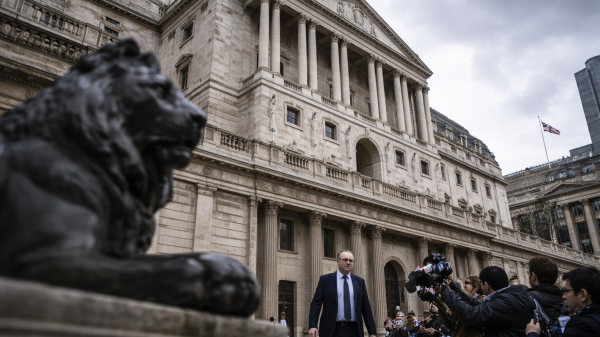The Bank of England is widely expected to lower interest rates on Thursday, marking its first cut since June 2023, as policymakers respond to weakening economic conditions.
The nine-member Monetary Policy Committee is anticipated to reduce rates by a quarter point to 4.5%, bringing borrowing costs to their lowest level in over a year.
Alongside its decision, the central bank will publish its quarterly economic outlook, which is expected to downgrade its growth forecast for 2025 from 1.5% to about 1%.
The revision would underscore the sluggish economic recovery and pose fresh challenges for Chancellor Rachel Reeves, whose budget plans rely on maintaining strict fiscal discipline.
Weak BOE forecast would increase scrutiny on OBR
Economists warn that a downward revision to growth expectations could complicate the government’s financial planning.
James Smith, an economist at ING, said a weaker Bank of England forecast would increase scrutiny on the Office for Budget Responsibility, which oversees government fiscal policy.
The OBR’s latest growth forecast was delivered to Reeves earlier this week and will play a crucial role in determining whether she can meet her self-imposed fiscal targets.
At the time of the October budget, the OBR projected 2% growth for 2025, a figure that appeared optimistic even then and has since looked increasingly unrealistic.
If the updated forecasts show the chancellor is on course to break her fiscal rules, she is expected to announce cuts to her spending plans when she addresses Parliament on March 26.
Reeves under pressure amid market volatility
While a fall in borrowing costs has provided some relief, market volatility continues to pressure the Treasury.
The yield on 10-year government bonds dropped to 4.42% on Wednesday, the lowest since mid-December, signaling expectations of lower interest rates ahead.
Lower bond yields reduce the government’s debt servicing costs, potentially giving Reeves more flexibility in her fiscal plans.
However, the Treasury remains cautious.
Chief Secretary to the Treasury Darren Jones has emphasized that Reeves’s fiscal rules are non-negotiable, suggesting that any worsening of the economic outlook could force spending cuts rather than additional borrowing.
More rate cuts expected, but timing remains uncertain
Thursday’s rate cut is expected to be the first of several in 2025.
Simon French, chief economist at investment bank Panmure Liberum, predicts as many as six quarter-point reductions this year.
However, he believes the Bank of England will proceed cautiously due to political uncertainties, delaying more aggressive cuts until late summer.
French said that a pivot to a faster pace of UK rate cuts is unlikely in the near term and that the Bank will likely wait until late summer before accelerating the process.
The Bank has also indicated that it will closely monitor the impact of Reeves’s budget, with some analysts warning that measures such as raising the minimum wage could push up inflation.
If price pressures persist, policymakers may hesitate to cut rates too quickly.
Will lower interest rates revive the economy?
The Bank of England aggressively raised rates from a historic low of 0.1% in 2021 to 5% in 2023 to combat inflation.
With economic growth stalling in the latter half of 2024, policymakers are now shifting toward monetary easing in the hope of stimulating activity.
Lower rates could reduce the cost of borrowing for businesses and homeowners, potentially lifting economic confidence.
However, some analysts remain skeptical about the immediate impact of a single rate cut.
Simon Pittaway, senior economist at the Resolution Foundation, said that a quarter-point rate cut is unlikely to result in a significant confidence boost.
Reeves has vowed to prioritise economic growth, promising to remove regulatory barriers and support major infrastructure projects, including a third runway at Heathrow Airport.
However, economists warn that such measures may take years to translate into significant economic benefits.
As the UK economy faces a challenging year ahead, the effectiveness of monetary policy in driving growth remains uncertain, leaving Reeves’s fiscal strategy in the spotlight.
The post Bank of England expected to cut rate as UK economic growth slows appeared first on Invezz




































